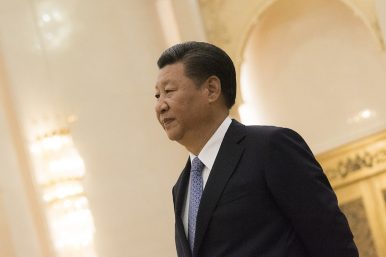By Ankit Panda
 Speaking earlier this month at the Aspen Security Forum, Christopher Wray, the director of the U.S. Federal Bureau of Investigation, was frank on his thoughts about China as an intelligence threat to the United States. “[China] represents the broadest, most challenging, most significant threat we face as a country,” Wray said, clarifying that he was speaking from a counter-intelligence perspective. The director justified that assessment by noting that Chinese espionage efforts in the United States manifested themselves in a “whole of state effort”.
Speaking earlier this month at the Aspen Security Forum, Christopher Wray, the director of the U.S. Federal Bureau of Investigation, was frank on his thoughts about China as an intelligence threat to the United States. “[China] represents the broadest, most challenging, most significant threat we face as a country,” Wray said, clarifying that he was speaking from a counter-intelligence perspective. The director justified that assessment by noting that Chinese espionage efforts in the United States manifested themselves in a “whole of state effort”.
“It is economic espionage as well as traditional espionage,” Wray went on to say. “It is non-traditional collectors as well as traditional intelligence operatives; it’s human sources as well as cyber means.”
These remarks came as most of U.S. society remains – with good reason – obsessed about the prospect of Russia interfering in the upcoming midterm elections. But while Russian active measures continue to make the headlines, China’s efforts go on in the background.
Wray notes that the FBI has counter-intelligence investigations on economic espionage traceable back to China open in all 50 U.S. states, underlining the depth and breadth of the problem for the United States.
America’s intellectual property edge – long dominant and apparent in fields as diverse as agriculture, military aviation, and commercial software – is quickly eroding.
No doubt, indigenous ingenuity in China has expanded, but the growing geopolitical contest between Beijing and Washington in the 21st century will quickly become one-sided as a result of China’s effective espionage efforts in the United States.
What’s more – and Wray didn’t get into this – Chinese counter-intelligence appears to be quickly gaining an edge against espionage efforts by the United States.
The CIA has lost several human sources all over China in recent years, as highlighted in a New York Times report last year.
One wonders, too, at the long-term value China will glean from the disastrous data breach at the U.S. Office of Personnel Management, which exposed the personal information of some 21 million government employees, including sensitive security clearance forms, to Chinese intelligence agencies.
Chinese attempts to build influence within the domestic political apparatuses of Western democracies have become well known, with recent cases in Australia and New Zealand. The United States isn’t next in line; these operations are well under way.
Unfortunately, the U.S. government has chosen to react in an unproductive manner to a well-placed concern about growing Chinese espionage successes in the United States.
Already, the United States is beginning to closely scrutinise academic visas for Chinese students and researchers entering sensitive fields, including science and engineering, in the United States.
To be sure, some scrutiny will be with merit. There are multiple known cases of Chinese researchers honing their talents in fields relevant to next-generation military technologies in the US, including in big data and artificial intelligence, and later taking these skills back to China to aid the modernization and competitiveness of the People’s Liberation Army.
But an indiscriminate overreaction – or, worse yet, a backlash against Chinese citizens encouraged by the government in Washington – will deepen US-China confrontation without helping the United States grow more competitive.
In the long haul, this would set the two countries on a divergent trajectory and increase acrimony and the odds of conflict.
If the United States is to maintain its edge over China and preserve its position as the pre-eminent global superpower, it’ll have to learn to compete effectively. Current trends do not bode well in that effort.
This article first appeared in the South China Morning Post. It is republished here with kind permission.
No comments:
Post a Comment